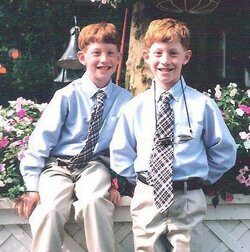 Over at Daily Kos, Michael Convente shares a fascinating story of using 23andMe data to pin down the precise relationship he has with his twin brother Matt. When Mike and Matt were born, the obstetrician told their mother that the presence of two separate placentas indicated that the brothers were non-identical (fraternal) twins – yet their incredibly similar appearance while growing up (see photo on left) suggested otherwise. Testing with 23andMe confirmed what the brothers had always suspected: that they are in fact identical twins. This is a useful reminder of the non-medical value of accessible genetic information: when it comes to unravelling these kinds of family mysteries, direct access to large-scale genetic data can be a powerful tool. [DM]
Over at Daily Kos, Michael Convente shares a fascinating story of using 23andMe data to pin down the precise relationship he has with his twin brother Matt. When Mike and Matt were born, the obstetrician told their mother that the presence of two separate placentas indicated that the brothers were non-identical (fraternal) twins – yet their incredibly similar appearance while growing up (see photo on left) suggested otherwise. Testing with 23andMe confirmed what the brothers had always suspected: that they are in fact identical twins. This is a useful reminder of the non-medical value of accessible genetic information: when it comes to unravelling these kinds of family mysteries, direct access to large-scale genetic data can be a powerful tool. [DM]
Readers who care about access to genetic information (i.e. all of you) and who are concerned about the potential effects of regulation on this access and on innovation in the field in general will soon have an opportunity to make their voices heard. Thanks to the efforts of Dan Vorhaus and others, the FDA has agreed to reopen the opportunity for public submissions while it deliberates on its next move following the agency-sponsored meeting on direct-to-consumer genetics last month. The submissions docket is apparently due to reopen today, and will remain open to submissions until the 2nd of May – so you all have a month to get your opinions in there. You’ll hear more from us about the process of submitting to the docket over the next week or so. [DM]
On a related note, genetic counsellor Christine Patch and academic (and Unzipped guest blogger) Barbara Prainsack have penned a response to the above-mentioned FDA meeting for BioNews. Patch and Prainsack provide a welcome note of nuance to the discussion; their final two paragraphs are worth quoting in full:
Although it is not certain that the advisory board’s recommendations will lead to legislative or regulatory action, the FDA’s activities have already had some (arguably unintended) consequences. They have polarised discussion about the benefits and downsides of DTC genetic testing. What’s more, the considerable attention that health authorities have paid to DTC genetic testing has ironically fostered the understanding that these tests typically provide meaningful and actionable health information.A genome as information is very different to a genetic test, but in the debate over DTC genetic tests there is a confusion and conflation of the two. The solution of making DTC genetic services only available through a physician both overemphasises the medical value of the genome analysis and also minimises the importance of appropriate quality standards.
Patch and Prainsack’s piece is a timely reminder that this debate is not simply a black-and-white clash between the “paternalists” – medical professionals and regulators – on one side, and genomic libertarians on the other. The American Medical Association’s attempt to bring health-related genetic testing wholly under the control of medical professionals is not something that would serve the interests of either patients or practitioners. [DM]
You’ll be pleased to hear that I’ve spared you from an elaborate and decidedly unfunny April Fools’ joke involving an analysis of genetic identity-by-descent between Luke and I, culminating in a “Luke, I am your father” punchline. Lucky you. [DM]








 RSS
RSS Twitter
Twitter
Hilarous.
היי הידעתם? ריהוט משרדי הינו כולל ארון משרדי וריהוט משרדי יוקרתי וארון משרדי